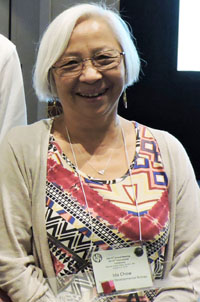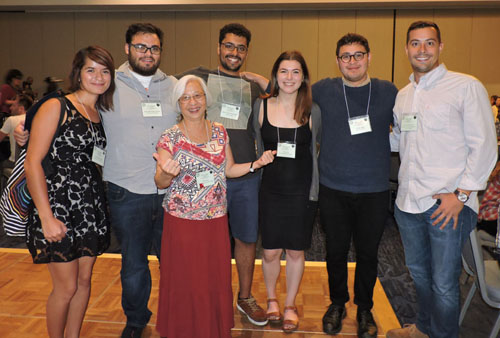Ida Chow Awarded 2016 Viktor
Hamburger Outstanding Educator Prize
By Marsha E. Lucas
 The
2016 Society for Developmental Biology
Viktor Hamburger Outstanding Educator Prize was
awarded to Ida Chow, Executive Officer of the
Society for Developmental Biology (SDB), for her
outstanding contributions to developmental biology
education. Chow has championed science education
since she began managing the Society in the early
1990s. She prioritized the mission of the SDB
Professional Development and Education Committee
(PDEC)—to nurture the professional development of
SDB members and facilitate learning and teaching of
developmental biology within and between the
academic community and the public. Education
sessions became an essential component of all SDB
regional and annual meetings ranging from outreach
activities for K-12 teachers to grant writing
workshops for young investigators. The
2016 Society for Developmental Biology
Viktor Hamburger Outstanding Educator Prize was
awarded to Ida Chow, Executive Officer of the
Society for Developmental Biology (SDB), for her
outstanding contributions to developmental biology
education. Chow has championed science education
since she began managing the Society in the early
1990s. She prioritized the mission of the SDB
Professional Development and Education Committee
(PDEC)—to nurture the professional development of
SDB members and facilitate learning and teaching of
developmental biology within and between the
academic community and the public. Education
sessions became an essential component of all SDB
regional and annual meetings ranging from outreach
activities for K-12 teachers to grant writing
workshops for young investigators.
Chow and PDEC member
Karen Bennett developed a biennial 2-day
Bootcamp for New Faculty which is held in
conjunction with the SDB Annual Meeting. Since 2006,
more than 120 postdocs and early career faculty have
gone through the program learning best practices for
teaching developmental biology, mentoring students,
and running a laboratory. This is one of the
society’s most successful programs.
In 2005, Chow secured a Pan-American Advanced
Studies Institute (PASI) program grant from the
National Science Foundation (NSF) to support a
satellite course to the Latin American Society
for Developmental Biology (LASDB) meeting in Brazil.
This cross-cultural exchange brought together
students and postdocs from the United States and
Latin America to explore diverse organisms and tools
for addressing essential questions in developmental
biology. Chow went on to co-organize three more PASI
short courses in conjunction with LASDB meetings in
Argentina (2008), Chile (2010), and Uruguay
(2012).
Chow, who was born in China and raised in Brazil,
began her career as a physiologist. She earned her
bachelor’s degree in morphology and embryology at
Escola Paulista de Medicina in São Paulo in 1969. In
her senior year, she conducted research on gut
epithelial development in the mouse with José Merzel.
After graduation, Chow continued to work with Merzel,
but was also hired by Carlos Alberto Magalhães, a
physiologist at the University, to teach a
physiology lab to psychology students at a nearby
institution. In a July interview, Chow described
Magalhães as her “first real mentor.” He gave her
career advice—from how to deal with people to how to
teach.
Chow left Brazil in 1971 to attend graduate school
in anatomy at McGill University in Montreal, Canada.
She studied the turnover rate of mouse mesothelial
cells for her master’s with
Charles Philippe (CP) Leblond, a cell biologist
best known for perfecting the use of autoradiography
in the detection of radioactive isotopes (and the
first to identify stem cells in adult tissues with
Yves Clermont). She earned her master’s degree
in 1974.
Wanting to get back to physiology, Chow switched
departments for her doctorate to study neuromuscular
junction formation with
Monroe W. Cohen. She used her training with
radioactive isotopes to label acetylcholine
receptors and study their distribution during
development in the frog.
Chow completed her doctorate in physiology in 1980
and headed to the University of California, Irvine
for a postdoc with neurobiologist
Mu-ming Poo. There she studied synapse formation
in Xenopus nerve-muscle cultures and electrical
coupling between muscle cells. After her postdoc,
she took a research physiologist position at the
University of California, Los Angeles before landing
a faculty position at American University in
Washington, DC in 1989.
Today, Chow stresses the importance of mentoring at
all levels. As a postdoc looking for a job and as an
early career faculty member, that was something she
missed.
“I really didn’t have knowledge about the
undergraduate system here—how things are done,” she
said.
As a result, she ended up in a situation where she
had to maintain an active research program, advise
students, publish regularly, all the while teaching
a heavy course load each semester. She approached
running a lab the same way she was trained—every
graduate student got their own project. The problem
was, at American University she only had master’s
students who left after two years. Her approach was
ineffective and left her with unfinished projects
and unwritten papers.
After seven years at American University, despite
having an active NIH grant, she was denied tenure.
It was a “lack of mentoring and lack of my own
knowledge,” she said.
“Because of my own experience, I feel that I need to
at least provide some opportunity for people to
learn about it.”
She has provided many such opportunities for
trainees and early career scientists in the
developmental biology community. In 1993, Chow began
organizing SDB meetings with support services from
the Federation of American Societies for
Experimental Biology (FASEB). After leaving her
faculty position in 1996, she began managing SDB
along with the Society for Leukocyte Biology until
2002.
Since the 1990s, SDB’s educational programming has
grown tremendously. Chow’s latest venture is called
Choose Development! (see
Scientia profile). Initially funded by NSF, the
program matches undergraduates from underrepresented
groups to labs of SDB members for multiple summers
of research and multilevel mentoring. The program
aims to increase the number of underrepresented
minorities and people with disabilities in the field
of developmental biology.
|
 |
|
Chow with Choose Development! mentor and
fellows at the
75th SDB Annual Meeting in Boston, MA.
(l-r) Iliana Hernandez, Jesus
Martinez-Gomez, Chow, Dylan Faltine-Gonzalez,
Talia Hart, Davys Lopez, Luis Colon
Cruz. |
“Scientific societies were not thought [of] by the
federal agencies as a means to reach out [to
underrepresented groups],” Chow said. They primarily
focused their program funding on universities. That
viewpoint has changed in recent years as agencies
have realized that scientific societies have a
national footprint that reaches beyond a single
campus, she said.
SDB was one of only three groups to receive the
Broadening Participation grant from the NSF
Division of Integrative Organismal Systems. To date,
19 students have participated in the program. All
but three who have completed their Bachelor’s degree
have gone on to graduate or medical school.
NSF funding for the program will come to a close in
2017, however, the program will continue to be
supported by the Society. Moving forward, Chow would
like to form partnerships with schools that have
Summer Undergraduate Research Programs (SURPs) to
share some of the costs of hosting students. The
other alternative she said, “Finding a sugar daddy
or sugar mommy who will give us a million dollars
[laughter].”
In 2010, Chow was elected a fellow of the American
Association for the Advancement of Science and in
2011 received a Service Award from the Society for
Developmental Biology. She is currently chair of the
Coalition of Scientific Societies—a partnership of
17 scientific organizations formed in 2005 in
response to
challenges in teaching evolution in science
classrooms across the country. In 2006, the
Coalition
conducted studies to support the National
Academy of Sciences in updating their publication
Science, Evolution, and Creationism.
Reflecting on her career she said, “I think the most
rewarding part is to work with people. To have the
opportunity to work with a variety of people from
all over the world, from all kinds of places.”
Interacting with people from different backgrounds
has taught her many things. “I used to be a little
bit more opinionated. Not that I’m not anymore
[laughter]. ...At least I learned I need to listen a
little bit more. I need to be a little bit more
understanding—at least try to see their point. It
doesn’t mean that I have to agree...but still, you
need to be more open.”
Winning the Hamburger Prize was a big surprise for
her. “Whether I think that I really deserve it or
not, I’ll let other people say,” she said.
She is honored though to share the prize with so
many great developmental biology educators. “It’s a
very high bar. I’m not sure that I can really reach
that bar. But, I’ll try to make it,” she said.
“It’s been fun. I think that is the most important
thing.”
|